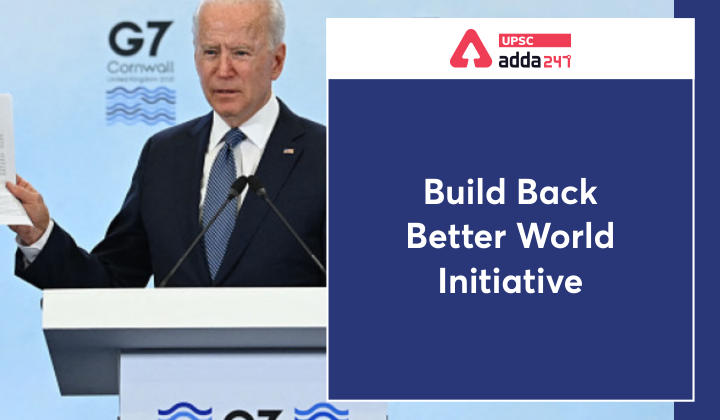Table of Contents
Relevance
- GS 2: Bilateral, regional and global groupings and agreements involving India and/or affecting India’s interests.
Context
- Recently, US officials have decided to tour Latin America to scout infrastructure projects, through an initiative named Build Back Better World.
India-US Clean Energy Agenda 2030 Partnership
Key points
- The group has been tasked with turning Build Back Better World (B3W) into reality.
- The program is focused on areas including climate, health, digital technology and gender equality.
- A formal US B3W launch event is planned for early next year that will include details of some initial projects aimed at narrowing the $40 trillion needed by developing nations by 2035.
- It is not yet decided how much capital the program will ultimately allocate.
About Build Back Better World initiative
- It is an international infrastructure investment initiative announced in June 2021 by the G7 countries—Canada, France, Germany, Italy, Japan, the United Kingdom and the United States.
- It is a values-driven, market-led, high-standard, and transparent infrastructure partnership to help narrow the $40+ trillion infrastructure gap in the developing world by 2035.
- It aims to mobilize bilateral and multilateral as well as private-sector capital for investment in climate, health and health security, modernized digital technology, gender equity, and equality.
- The B3W is intended to be global in scope and to cover low- and middle-income countries.
- The B3W is an elaboration of the Blue Dot Network (BDN) in which the US joined forces with Japan and Australia while remaining open to other partners’ participation.
- The B3W has brought together the G7 countries and also has extended invitations to join to other democracies, including India, Australia, South Korea.
B3W and BRI: Rival or complementary?
- Although the B3W does not explicitly refer to the BRI, many experts believes that the new US-led initiative is intended to be an alternative grand infrastructure plan for developing nations to that of China’s Belt and Road Initiative (BRI).
- The BRI comprises a framework of economic and trade relations between China and dozens of countries.
- It targets new export markets abroad, aims to guarantee Beijing’s energy security, and seeks to enhance cross-continental connectivity and foster integration between China and Europe.
- Like the BRI, the B3W aims to forge cross-national and regional cooperation between the countries involved while facilitating large-scale projects in the developing world.
- However, the B3W has yet to evolve from the vision into a concrete plan.
- Even when B3W comes into reality, the aims of both the initiatives are different.
- China’s BRI is primarily focused on traditional hard infrastructure: ports, roads, dams, railways, electric power plants, and telecommunication facilities.
- In comparison, the B3W focuses on “softer” outcomes, namely improvements in climate, health and health security, modernized digital technology, and gender equity and equality.




 TSPSC Group 1 Question Paper 2024, Downl...
TSPSC Group 1 Question Paper 2024, Downl...
 TSPSC Group 1 Answer key 2024 Out, Downl...
TSPSC Group 1 Answer key 2024 Out, Downl...
 UPSC Prelims 2024 Question Paper, Downlo...
UPSC Prelims 2024 Question Paper, Downlo...




